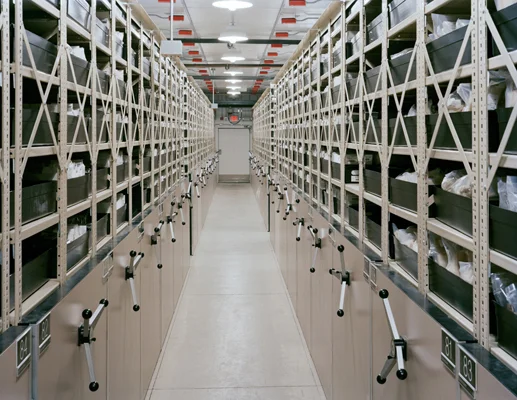A Look Inside The Federal Seed Vault Housing Big Secrets
A Safe Haven For The Good, The Bad And The Downright Ugly
What started as a 360-year project meant to determine how long seeds last, now exists as a seemingly neutral entity with dark connections. I'm talking about the Federal Seed Vault in Fort Collins Colorado. Just about every explanation for what the seeds being held at this facility mean for our collective future is filtered through some agenda or another. Especially when it comes to the seeds held by privately owned Monsanto; herbicide developers and GMO seed pushers.
The Federal Seed Vault, also called the National Center for Genetic Resources Preservation (NCGRP), holds more than just seeds. Radio journalist Grace Hood captured images of microbes, semen, and animal embryos in the cold storage of the heavily secured and monitored seed bank. As the 'genetic resources' part of the name may have hinted to you, this place is now about more than just seeds. The NCGRP is about seed preservation, granted. But beneath the surface level of the center's angelic public image as a safe haven for guarding tomorrow's seeds, it can also be seen in a more sinister light such as being a sanctuary for the next doomsday Agent Orange or similarly dangerous plant-derived toxin. This is especially worrying for the locals of Fort Collins; presumably, the first to be affected by any plans tied to introducing the new seeds from Monsanto held at the facility, into the food supply.
Dupont, as well as other non-corporate entities, houses seeds at the NCGRP; so, use of the facility is not strictly directed by the federal government. Attached to the Federal Seed Vault are nearly endless combinations of possibilities tied to the food supply, international trade, and corporate as well as unknown business interests. Interests that often appear to outweigh concern for public interests. And that statement on business interests isn't just my opinion. It is evidenced by more than half of all Americans, expressing feelings of concern about eating GMO foods, says the Pew Research Center. Unfortunately, the ongoing outcry has gone unheard by lawmakers who will not make GMO labels mandatory.
For everything that happens below the radar within the vaults, discrete measures have been taken to ensure that all the clandestine activities remain undisclosed. Seeds are labeled by barcode and only those who have access to the vault's database are able to determine what’s being held where. Why should you care? Scientist Carol Mallory-Smith discovered that Monsanto's Round Up resistant wheat (Round Up is a chemical herbicide manufactured by Monsanto) had been distributed without the knowledge of farmers or the government, which had not regulated or tested the product. Monsanto has a long history of successfully suing farmers and getting off on cases brought against the corporation. You could lose a day reading up on these cases, and so perhaps to no one's surprise, Monsanto was found innocent of any crime after having been officially under suspicion.
In any case, Monsanto burning 1,500 pounds of the Round Up resistant wheat pulled from the National Seed Reserve after beating the case, looks at least a little suspicious. This was in 2011, but interestingly enough, field trials officially closed on this same wheat in 2005 after the corporation had originally been found distributing the wheat among farmers without permission from the government or anyone else.
Now that you know about the existence of the Fort Knox for precious seeds in Colorado, as it has been dubbed by the media, you have a slightly more expanded view about the possible indiscretions that can occur within our food supply and should begin to put more scrutiny on the source of your staple foods and how they are grown. Consider growing your own GMO-free produce. Small herb gardens can be kept on countertops, tomato plants can be hung from an indoor ceiling, and a small vegetable garden can be kept on a patio or balcony. Space is not an issue. Be sure to purchase GMO-free seeds that have not been registered with Monsanto or Seminis trademarks. The Safe Seed Pledge has been taken by over 300 seed companies including Seed Savers Exchange, Baker Creek, the Southern Exposure Co-Op, Grow Organic, and Seeds of Change. The pledge speaks of a refusal to sell genetically engineered seeds and plants, proclaims the biological and economic risks associated with GMO foods, and promises dedication to a healthy environment and people. Purchasing seeds from any of the companies I’ve named here, or any that have taken the Safe Seed Pledge, is a great way to be sure you’re fueling your body with clean, healthy, and chemical free food; grown as nature intended.
Read the pledge in its entirety here.










